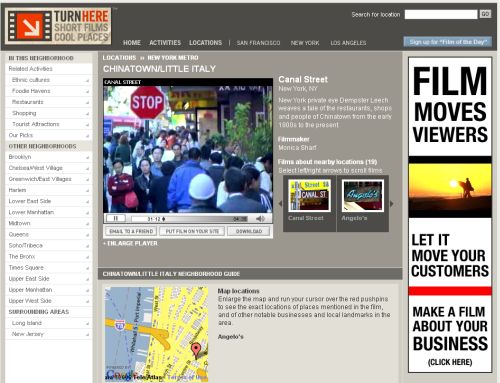von Roland Hachmann | Juni 4, 2006 | Blog
Some more information about this huge project can be found here (in German).
von Roland Hachmann | Juni 4, 2006 | Blog
I have just opened up a new category: Football Worldcup. As things get chaotic here in Frankfurt due to the worldcup, there are also numerous ads and marketing things happening. I will try to display as many as I can in this category.
On the 9th of July, when the worldcup is finished, this category shall be closed again.
von Roland Hachmann | Juni 4, 2006 | Blog, Digital Culture, Digital News
An interesting experiment by the organisation „Future of the Book“ and University Professor McKenzie Wark is the new book GAM3R 7H30RY

It’s completely web-based and the reader can flick through cards of content when reading the book. This way, the user can easily find content again, but the main benefit is that users can comment on specific parts of the book.
I still find reading long copy on the screen a little difficult, but the idea of having an interactive book is great. Just commenting on things can be difficult in the beginning:
it occurs to me that it would be really helpful to see an outline of the book. Not just the chapter titles you’ve got above the cards, but a more detailed outline. That way, your readers wouldn’t necessarily have to read every word before making a comment that might turn out to be premature.
von Roland Hachmann | Mai 31, 2006 | Blog, Digital Culture, Digital News
Well, the title is a little overpromising. Sofar, TurnHere.com only covers parts of the USA. But nevertheless, the idea is nice. and some of the films are really made will with a lot of effort by all the individuals. Just like this one here:

New York private eye Dempster Leech weaves a tale of the restaurants, shops and people of Chinatown from the early 1800s to the present.
von Roland Hachmann | Mai 29, 2006 | Blog, Digital News
This book could be interesting: Transformation. A forthcoming book by Grant McCracken, who now, writes a little about his book:
This book argues that there’s a new cultural regime, one that is, I believe, changing how we define the individual, the self, our culture and our economy.
He jumps right into the discussion about how commerce and pop culture has influenced our lives until today.
The academics and the essayists insisted that popular culture was a corruption, that the consumer was a dupe, that something had gone terribly wrong now that capital and commerce had been allowed to interfere with culture.
He counters that argument, saying:
Popular culture got steadily better. We did not dumb down and out. TV improved. […] The parts of culture not touched by commerce, well, many of them descended into self absorption and incoherence. As Tyler Cowen pointed out, commerce is actually good for culture. Go figure. Shakespeare did.
This could turn out to be a very interesting read!
von Roland Hachmann | Mai 27, 2006 | Blog, Digital Culture
iGod is The Voice of St Matthew’s – a Godcast for sermons, etc.
Sounds crazy, but then again: why not? There will, most likely, be a huge audience for these kind of podcasts. And for the church its an easy way to spread their message.

von Roland Hachmann | Mai 26, 2006 | Blog, Digital Culture
psfk has a short interview of Chris Anderson, author of „The Long Tail“ – a book which I am definitely goint to get.
Somehow I get the feeling that this is already part of Chris‘ promotion tour. Not that I blame him, in fact, I hope he will have a very good promotional campaign around his book. Because, as he says:
Many people have noted how ironic it would be if my book on niches becomes a hit. I can live with that 😉
What he writes about in his forthcoming book (at least from what I can guess from his blog) are quite fundamental things influencing our society these days and in the future.
His idea of the „long tail“ will be equally important as ideas such as the „tipping point“ or the „wisdom of the crowds„.
Yet, he describes a phenomenon which is, in a way, completely new to our civilisation, since it requires a certain technological and network infrastructure, that men didn’t have sofar.
This stands in contrast to the ideas of the other two book examples that came to my mind – those ideas were known of and relevant for some time, with the only distinction, that only now two writers of „The New Yorker“ had put down these psychological/sociological theories into everyday speak for the common hobby-intellectual (like myself).





 Wo ich sonst so bin...
Wo ich sonst so bin...